大学英语精读第二册课件Unit2
- 格式:pdf
- 大小:1.24 MB
- 文档页数:12
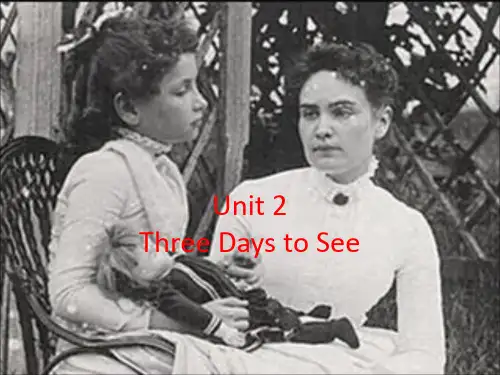
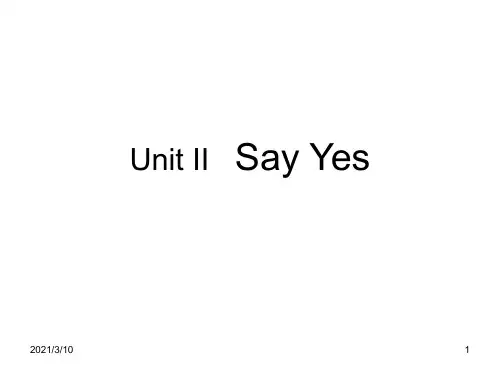
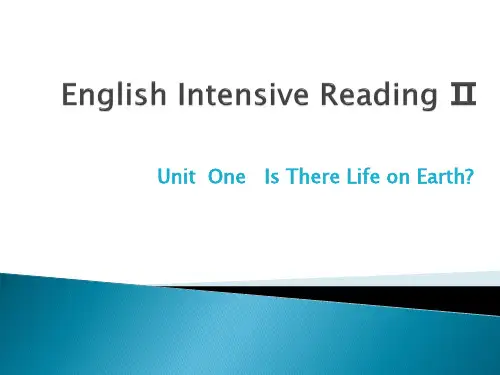
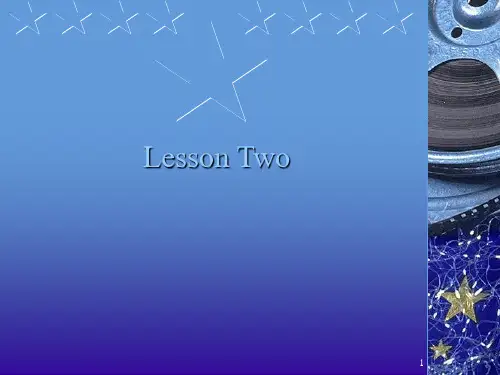
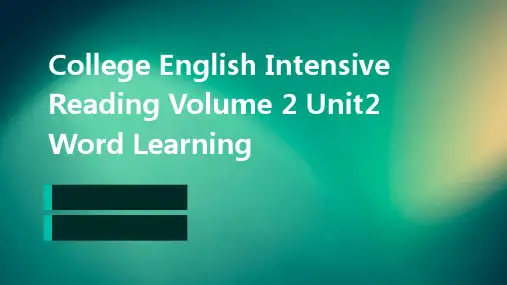

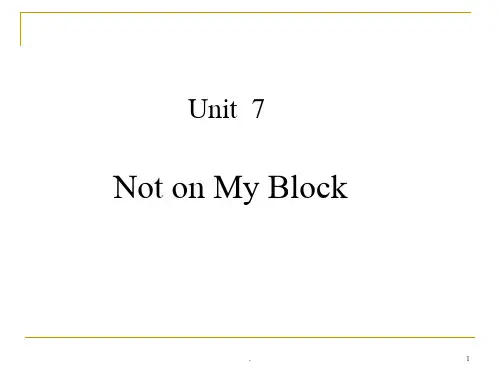
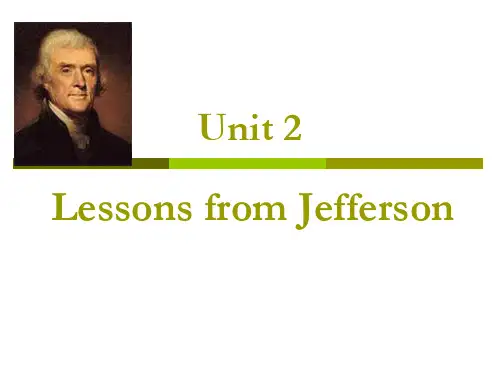
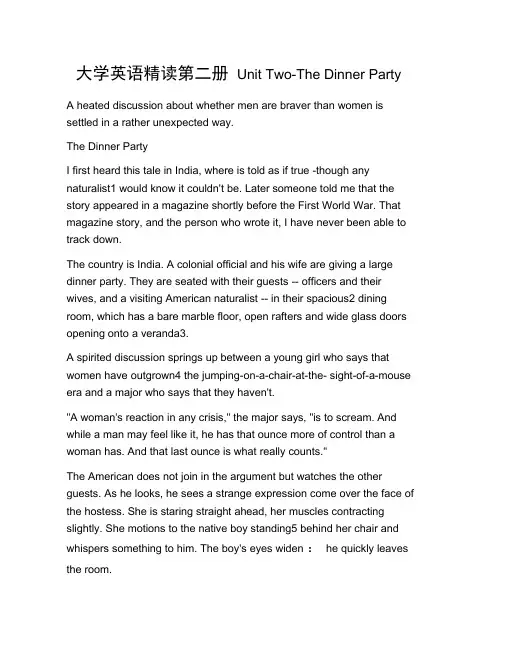
大学英语精读第二册Unit Two-The Dinner PartyA heated discussion about whether men are braver than women is settled in a rather unexpected way.The Dinner PartyI first heard this tale in India, where is told as if true -though any naturalist1 would know it couldn't be. Later someone told me that the story appeared in a magazine shortly before the First World War. That magazine story, and the person who wrote it, I have never been able to track down.The country is India. A colonial official and his wife are giving a large dinner party. They are seated with their guests -- officers and their wives, and a visiting American naturalist -- in their spacious2 dining room, which has a bare marble floor, open rafters and wide glass doors opening onto a veranda3.A spirited discussion springs up between a young girl who says that women have outgrown4 the jumping-on-a-chair-at-the- sight-of-a-mouse era and a major who says that they haven't."A woman's reaction in any crisis," the major says, "is to scream. And while a man may feel like it, he has that ounce more of control than a woman has. And that last ounce is what really counts."The American does not join in the argument but watches the other guests. As he looks, he sees a strange expression come over the face of the hostess. She is staring straight ahead, her muscles contracting slightly. She motions to the native boy standing5 behind her chair and whispers something to him. The boy's eyes widen :he quickly leaves the room.Of the guests, none except the American notices this or sees the boy place a bowl of milk on the veranda just outside the open doors.The American comes to with a start. In India, milk in a bowl means only one thing -- bait for a snake. He realizes there must be a cobra in the room. He looks up at the rafters -the likeliest place -- but they are bare. Three corners of the room are empty, and in the fourth the servants are waiting to serve the next course. There is only one place left -- under the table.His first impulse is to jump back and warn the others, but he knows the commotion6 would frighten the cobra into striking. He speaks quickly, the tone of his voice so commanding that it silences everyone."I want to know just what control everyone at this table has.I will count three hundred -- that's five minutes -- and not one of you is to move a muscle. Those who move will forfeit7 50 rupees. Ready?"The 20 people sit like stone images while he counts. He is saying "...two hundred and eighty..." when, out of the corner of his eye, he sees the cobra emerge and make for the bowl of milk. Screams ring out as he jumps to slam the veranda doors safely shut."You were right, Major!" the host exclaims. "A man has just shown us an example of perfect self-control.""Just a minute," the American says, turning to his hostess."Mrs. Wynnes, how did you know that cobra was in the room?"A faint smile lights up the woman's face as she replies :"Because it was crawling across my foot."NEW WORDSheateda. with strong, excited, and often angry feelings 热烈的;激烈的unexpecteda. not expected 意外的naturalistn. one who makes a special study of plants or animalsoutdoors 博物学家(尤指直接观察动植物者)shortlyad. Soon; (in) a little time 不久,马上colonial]a. of or related to a colony or colonies 殖民地的spaciousa. big; having much space 广阔的;宽阔的diningn. 餐厅bare。

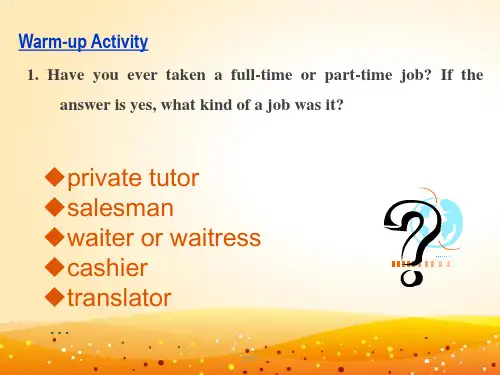
大学英语精读第二册U n i t2L e s s o n s f r o m J e f f e r s o n(总3页)--本页仅作为文档封面,使用时请直接删除即可----内页可以根据需求调整合适字体及大小--Jefferson died long ago, but many of his ideas are still of great interest.Unit2 Lessons from JeffersonThomas Jefferson, the third President of the United States, maybe less famous than George Washington and Abraham Lincoln, but most people remember at last one fact about him: he wrote the Declarationof Independence.Although Jefferson lived more than 200 years ago, there is much that we learn from him today. Many of his ideas are especially interesting to modern youth. Here are some of the things he said and wrote:1. Go and see. Jefferson believed that a free man obtains knowledge from many sources besides books and that personal investigation is important. When still a young man, he was appointedto a committee to find out whether the South Branch of the JamesRiver was deep enough to be used by large boats. While the other members of the committee sat in the state capitol and studied papers on the subject, Jefferson got into a canoe and made on-the-spot-observations.2. You can learn from everyone. By birth and by educationJefferson belonged to the highest social class. Yet, in a day whenfew noble persons ever spoke to those of humble origins except togive an order, Jefferson went out of his way to talk with gardeners, servants, and waiters. Jefferson once said to the French nobleman, Lafayette, "You must go into the people's homes as I have done, look into their cooking pots and eat their bread. If you will only do this, you may find out why people are dissatisfied and understand the revolution that is threatening France."3. Judge for yourself. Jefferson refused to accept other people's opinions without careful thought. "Neither believe nor reject anything," he wrote to his nephew, "because any other person has rejected or believed it. Heaven has given you a mind for judgingtruth and error. Use it."Jefferson felt that the people "may safely be trusted to hear everything true and false, and to form a correct judgment. Were itleft to me to decide whether we should have a government without newspapers or newspapers without a government, I should not hesitatea moment to preferthe latter."4. Do what you believe is right. In a free country there will always be conflicting ideas, and this is a source of strength. It is conflict and not unquestioning agreement that keeps freedom alive. Though Jefferson was for many years the object of strong criticism,he never answered his critics. He expressed his philosophy in lettersto a friend, "There are two sides to every question. If you take one side with decision and on it with effect, those who take the other side will of course resent your actions."5. Trust the future; trust the young. Jefferson felt that the present should never be chained to customs which have lost their usefulness. "No society," he said, "can make a perpetual constitution, or even a perpetual law. The earth belongs to the living generation." He did not fear new ideas, nor did he fear the future. "How much pain," he remarked, "has been caused by evils which have never happened! I expect the best, not the worst. I steer my ship with hope, leaving fear behind."6. Jefferson's courage and idealism were based on knowledge. He probably knew more than any other man of his age. He was an expert in agriculture, archeology, and medicine. He practiced crop rotation and soil conservation a century before these became standard practice,and he invented a plow superior to any other in existence. He influenced architecture throughout America, and he was constantly producing devices for making the tasks of ordinary life easier to perform.7. Of all Jefferson's many talents, one is central. He was aboveall a good and tireless writer. His complete works, now being published for the first time, will fill more than fifty volumes. His talent as an author was soon discovered, and when the time came to write the Declaration of Independence at Philadelphia in 1776, the task of writing it was his. Millions have thrilled to his words: "We hold these truths to be self-evident, that all men are created equal…"8. When Jefferson died on July 4, 1826, the 50th anniversary of American independence, he left his countrymen a rich legacy of ideas and examples. American education owes a great debt to Thomas Jefferson, who believed that only a nation of educated people could remain free.大学英语精读第二册 Unit 3 My First JobTrying to make some money before entering university, the author applies for a teaching job. But the interview goes from bad to worse... My First Job While I was waiting to enter university, I saw advertised in a local newspaper a teaching post at a school in a suburb of London about ten miles from where I lived. Being very short money and wanting to do something useful, I applied, fearing as I did so, that without a degree and with no experience in teaching my chances of getting the job were slim.However, three days later a letter arrived, asking me to go to Croydon for an interview. It proved an awkward journey: a train to Croydon station; a ten-minute bus ride and then a walk of at least a quarter to feel nervous.The school was a red brick house with big windows, The front garden was a gravel square; four evergreen shrubs stood at each corner, where they struggled to survive the dust and fumes from a busy main from a busy main road.It was clearly the headmaster himself that opened the door. He was short and fat. He had a sandy-coloured moustache, a wrinkled forehead and hardly any hair. He looked at me with an air of surprised disapproval, as a colonel might look at a private whose bootlaces were undone. 'Ah yes,' he grunted. 'You'd better come inside.' The narrow, sunless hall smelled unpleasantly of stale cabbage; the walls were dirty with ink marks; it was all silent. His study, judging by the crumbs on the carpet, was also his dining-room. 'You'd better sit down,' he said, and proceeded to ask me a number of questions: what subjects I had taken in my General School Certificate; how old I was; what games I played; then fixing me suddenly with his bloodshot eyes, he asked me whether I thought games were a vital part of a boy's education. I mumbled something about not attaching too much importance to them. He grunted. I had said the wrong thing. The headmaster and I obviously had very little in common.The school, he said, consisted of one class of twenty-four boys, ranging in age from seven to thirteen. I should have to teach all subjects except art, which he taught himself. Football and cricket were played in the Park, a mile away on Wednesday and Saturday afternoons.The teaching set-up filled me with fear. I should have to divide the class into three groups and teach them in turn at three different levels; and I was dismayed at the thought of teaching algebra and geometry-two subjects at which I had been completely incompetent at school. Worse perhaps was the idea of Saturday afternoon cricket; most of my friends would be enjoying leisure at that time. I said shyly, 'What would my salary be' 'Twelve pounds a week plus lunch.' Before I could protest, he got to his feet. 'Now', he said, 'you'd better meet my wife. She's the one who really runs this school.'This was the last straw. I was very young: the prospect of working under a woman constituted the ultimate indignity.。
UNIT2杰斐逊很久以前就死了,但是我们仍然对他的一些思想很感兴趣,杰斐逊的箴言, 布鲁斯.布利文、托马斯.杰斐逊美国第三任总统,也许不像乔治.华盛顿和亚伯拉罕.林肯那样著名,但大多数人至少记得有关他的一件事实:《独立宣言》是他起草的。
虽然杰斐逊生活在二百多年以前,但我们今天仍可以从他身上学到很多东西。
他的许多思想对当代青年特别有意义。
下面就是他讲过和写到过的一些观点:自己去看。
杰斐逊认为,一个自由的人除了从书本中获取知识外,还可以从许多别的来源获得知识;亲自做调查是很重要的。
当他还年轻的时候,他就被任命为一个委员会的成员,去调查詹姆斯河南部支流的水深是否可以通行大型船只。
委员会的其他成员都坐在州议会大厦内,研究有关这一问题的文件,而杰斐逊却跳进一只独木舟去做现场观测。
你可以向任何人学习。
按出身及其所受的教育,杰斐逊均属于最高的社会阶层。
然而很少跟出身卑贱的人说话的年代,在那个贵人们除了发号施令以外。
杰斐逊却想尽办法跟园丁、仆人和侍者交谈。
有一次杰斐逊曾这样对法国贵族拉斐特说:你必须像我那样到平民百性的家里去,看看他们的烧饭锅,吃吃他们的面包。
只要你肯这样做,你就会发现老百姓为什么会不满意,你就会理解正在威胁着法国的革命。
”自已作判断。
未经过认真的思考,杰斐逊绝不接受别人的意见。
“不要相信它或拒绝它。
”他在给侄子的信中写道,“因为别的人相信或拒绝了什么东西。
上帝赐予你一个用来判断真理和谬误的头脑。
那你就运用它吧。
杰斐逊觉得人民是“完全可以依赖的,应该让它们听到一切真实和虚伪的东西,然后作出正确的判断。
倘使让我来决定,我们是应该有一个政府而不要报纸呢,还是应该有报纸而不要政府,我会豪不犹豫地选择后者。
”做你认为是正确的事。
在一个自由的国家里总会有各种相互冲突的思想,而这正是力量的源泉。
使自由保持活力的是冲突而不是绝对的一致。
虽然有好多年杰斐逊一直受到激烈的批评,但他从不回答那些批评他的人。
他在想写给一位朋友的信中表达他自己的观点:“每个问题都有两面。
Unit 2Part I New Wordsdeclaration n. 宣布,宣告,宣言,声明a declaration of independence 独立宣言The government will issue a formal declaration tomorrow. 政府将于明天发布正式声明。
declare v. 断言,宣称He declared (that) he was right. 他力陈他是对的。He declared his true feelings to her. 他向她表白了自己的真实感情。
independence n. 独立;自主;自立I've always valued my independence. 我一向很重视自己的独立。I-Day 美国独立纪念日(7月4日)Young people have more independence these days. 现在的年轻人更加独立自主。
independent a. 自主的;独立的India became independent in 1947. 印度于1947年独立。I wanted to remain independent in old age. 我希望年老时还能自给自足(独立生活)。
obtain v. 得到,获得;行,得到公认,应用Where can I obtain the book? 我在哪里能买到(得到)这本书?These ideas no longer obtain. 这些见解已经行不通了。Different laws obtain in different places. 不同的法律适用在不同的地方。
besides prep./ad. 除…以外(还);而且,也He had other people to take care of besides me. 除了我以外, 他还需要照料其他人。I don't want to go; besides, I'm too tired. 我不想去, 再说我也太累了。
investigation n. 调查,审查The letter calls for an investigation of the facts. 来信要求对这些事实进行调查。The singer is currently under investigation for possessing illegal drugs. 这名歌手正在接受关于非法藏毒的调查。
investigate v. 调查Everyone with a possible interest in your brother's death must be thoroughly investigated. 所有可能与你兄弟死亡有利害关系的人都必须予以彻底调查。The police are investigating the murder. 警察在调查那起凶杀案件。
appoint v. 任命,委派;约定She has been appointed to the board. 她被任命为董事会董事(board of administration, board of directors)。We must appoint a day to meet again. 我们要约定好下次会面的日期。appointment n. 任命,委派;约会,约定I have an appointment with him at four o'clock. 我和他四点钟有个约会。The board has confirmed the appointment of James as Sales Manager. 董事会确认任命詹姆斯为销售经理。
committee n. 委员会a committee meeting 委员会会议financial committee 财政[务]委员会I talked to some of the people on the committee. 我在委员会会议上跟几位委员谈了话。
capitol n. 议会大厦;美国州议会大厦capital n. 首都,首府;资本,资金
canoe n. 独木舟 v. 划独木舟They slid the canoe down to the water. 他们使小舟滑到水中。He had once canoed down the Nile. 他曾划着独木舟顺尼罗河而下。
on-the-spot a. 现场的,当场的humble a. 谦卑的,谦逊的I felt very humble when meeting her. 遇到她时我觉得很卑微。He built the business empire from humble beginnings. 他从小生意开始逐步建立了这个商业王国。
origin n. 起源,由来;出身,血统the origins of civilization 文明的起源The Origin of Species 物种起源He had risen from humble origins through hard work. 他出身卑微,通过努力工作才获得了成功。Her family is Portuguese in origin. 她的家族是葡萄牙血统。
original a.原来的;最初的;创新的The original settlers in the American are the Indians. 最早在这里定居的是印第安人。the original owner of the house 房子原主人an original idea创新的构想(原创思维)
originally ad. 一开始,起初;原来Potatoes originally came from South America. 马铃薯原产于南美。
gardener n. 园丁,花匠/ garden n. 花园nobleman n. 贵族=noblenoble a. 高贵的,高尚的It was very noble of you to look after your old neighbour when she was sick. 你的心真好, 你的老邻居生病时你一直照料她。When the nobles rebelled, the king battled them. 当贵族谋反时, 国王便出兵攻打他们。
dissatisfy v. 使(某人)不满 / dissatisfaction n. 不满I have tried to write this story five times but I am still dissatisfied with me. 我已经把这个故事写了五遍了,可是我还是不满意。She expressed her dissatisfaction with him. 她对他表示不满。
satisfy v. 使满意,使满足 / satisfaction n. 满足,满意Social services is trying to satisfy the needs of so many different groups. 社会服务部门正努力满足许多不同群体的需要。Although we didn’t win, we were able to take some satisfaction from our performance. 虽然没赢,但我们对自己的表现还是比较满意。
satisfied a. 满意的,满足的 / dissatisfied a. 感到不满的,不高兴的There was a dissatisfied look in the manager’s eyes. 经理的眼睛里露出不满的神色。
threaten v. 威胁The boss threatened to fire her. 老板威胁要开除她。She threatened him with a gun. 她用枪威胁他。
threat n. 威胁His threats are just talk. Don’t worry! 他的威胁只不过是空话而已, 不要担心!The government refused to give in to the hijackers’ threats. 政府拒绝屈服于劫机者的威胁。
reject v. 拒绝,抵制He was afraid she would reject him. 他担心她会拒绝他。The board rejected all our ideas. 董事会拒绝了我们的所有意见。
rejection n. 拒绝,抵制Children who have had bad experiences fear rejection. 有过不幸遭遇的孩子害怕遭人嫌弃。He decided not to approach her for fear of rejection. 他因怕遭拒绝决定不再去找她。
nephew n. 侄子,外甥 / niece n. 侄女,外甥女error n. 错误,差错spelling errors 拼写错误
judgment n. 判断;审判;看法I acted on my own judgment. 我按自己的判断行事。They obtained a judgment in their favour. 他们得到了胜诉的判决。Landing a plane requires fine judgment. 驾驶飞机着陆需要准确的判断。